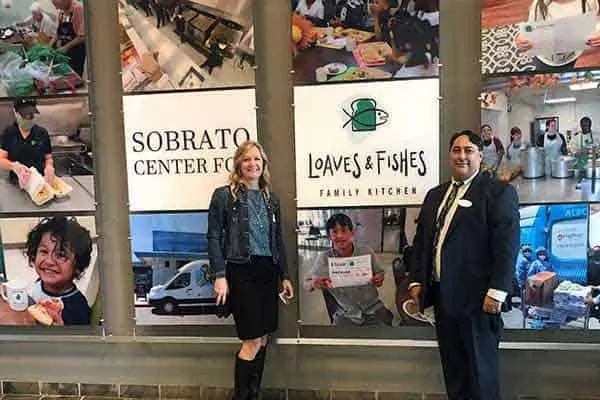


California’s SB 1383, the Short-Lived Climate Pollutants Act, sets a statewide goal for reducing organic waste to landfills of 50 percent by 2020, and 75 percent by 2025. Included in SB 1383 is a goal to recover 20 percent of edible food waste for human consumption.
Meeting these requirements, particularly the recovery of edible food, is not as straightforward as it might seem. For example, it is difficult to accurately identify edible food from other waste once it’s in the waste stream.
“We can estimate the amount of edible food during waste characterizations, but we find working directly with businesses to identify the edible food they can make available and in what quantities is a more holistic approach,” said Tracie Bills, SMM Northern California Director. “We assist businesses with identifying edible food recovery partners with reputable community programs to distribute food to people in need.”
SCS Engineers partners with Loaves & Fishes Family Kitchen in San Jose to create a sustainable solution that could become a model for how municipalities can meet the 20-percent food recovery requirement.
Loaves & Fishes is a non-profit organization with roots going back 40 years. It’s grown from a simple soup kitchen to one of the leading providers of meals in Santa Clara and San Mateo Counties. The organization recently opened its new location in San Jose.
“Last year, we served more than 1 million meals, almost twice as many as just a couple of years ago,” said Mauricio Cordova, Loaves & Fishes’ COO. “With the help of local restaurants, grocery stores, and others, we’re able to use the food they can’t use to feed residents in need. In our new building, we expect to increase capacity to 10,000 meals per day.”
“Creating these partnerships isn’t part of our typical scope of work,” adds Bills. “But it’s important to go beyond simply identifying edible food. As we work with potential contributors and partners, we’re able to create a sustainable network that achieves a common goal.”
Says Cordova, “Through our A La Carte Food Recovery program, we can help companies divert perfectly safe and usable food away from composting and landfills, and re-distribute them in the form of meals to our most vulnerable neighbors. The all-around win is that people in dire need of food assistance – compounded by the impact of Covid-19 – can receive healthy, nutritious food, and companies lessen their food waste levels and greenhouse gas emissions.”
Loaves & Fishes has recovered more than 1 million pounds of edible groceries and reduced greenhouse gas emissions by 1,058 metric tons.
Learn more about sustainable materials management.